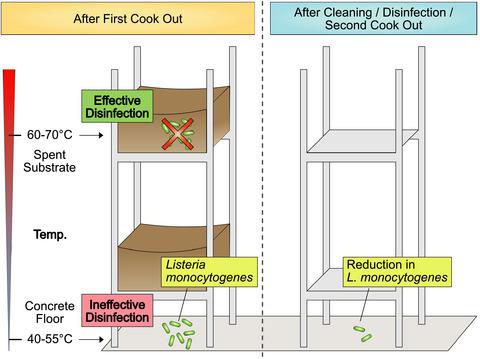当前位置:
X-MOL 学术
›
Food Sci. Nutr.
›
论文详情
Our official English website, www.x-mol.net, welcomes your
feedback! (Note: you will need to create a separate account there.)
Effectiveness of current hygiene practices on minimization of Listeria monocytogenes in different mushroom production-related environments.
Food Science & Nutrition ( IF 3.5 ) Pub Date : 2020-05-20 , DOI: 10.1002/fsn3.1629 Vincenzo Pennone 1, 2 , Kenneth Lyonel Dygico 3, 4 , Aidan Coffey 2 , Cormac G M Gahan 4 , Helen Grogan 3 , Olivia McAuliffe 1 , Catherine M Burgess 3 , Kieran Jordan 1
Food Science & Nutrition ( IF 3.5 ) Pub Date : 2020-05-20 , DOI: 10.1002/fsn3.1629 Vincenzo Pennone 1, 2 , Kenneth Lyonel Dygico 3, 4 , Aidan Coffey 2 , Cormac G M Gahan 4 , Helen Grogan 3 , Olivia McAuliffe 1 , Catherine M Burgess 3 , Kieran Jordan 1
Affiliation

|
The commercial production of Agaricus bisporus is a three stage process: 1) production of compost, also called “substrate”; 2) production of casing soil; and 3) production of the mushrooms. Hygiene practices are undertaken at each stage: pasteurization of the substrate, hygiene practices applied during the production of casing soil, postharvest steam cookout, and disinfection at the mushroom production facilities. However, despite these measures, foodborne pathogens, including Listeria monocytogenes, are reported in the mushroom production environment. In this work, the presence of L. monocytogenes was evaluated before and after the application of hygiene practices at each stage of mushroom production with swabs, samples of substrate, casing, and spent mushroom growing substrates.
中文翻译:

当前卫生习惯对不同蘑菇生产相关环境中单核细胞增生李斯特氏菌最小化的有效性。
双孢蘑菇的商业化生产分为三个阶段:1)堆肥的生产,也称为“基质”; 2)覆土土的制作; 3)蘑菇的生产。每个阶段都采取卫生措施:基质巴氏灭菌、覆土生产过程中采用的卫生措施、采后蒸汽烹调以及蘑菇生产设施的消毒。然而,尽管采取了这些措施,蘑菇生产环境中仍报告有食源性病原体,包括单核细胞增生李斯特菌。在这项工作中,利用拭子、基质样品、肠衣和用过的蘑菇生长基质在蘑菇生产的每个阶段应用卫生习惯之前和之后评估了单核细胞增生李斯特菌的存在。
更新日期:2020-05-20
中文翻译:

当前卫生习惯对不同蘑菇生产相关环境中单核细胞增生李斯特氏菌最小化的有效性。
双孢蘑菇的商业化生产分为三个阶段:1)堆肥的生产,也称为“基质”; 2)覆土土的制作; 3)蘑菇的生产。每个阶段都采取卫生措施:基质巴氏灭菌、覆土生产过程中采用的卫生措施、采后蒸汽烹调以及蘑菇生产设施的消毒。然而,尽管采取了这些措施,蘑菇生产环境中仍报告有食源性病原体,包括单核细胞增生李斯特菌。在这项工作中,利用拭子、基质样品、肠衣和用过的蘑菇生长基质在蘑菇生产的每个阶段应用卫生习惯之前和之后评估了单核细胞增生李斯特菌的存在。










































 京公网安备 11010802027423号
京公网安备 11010802027423号